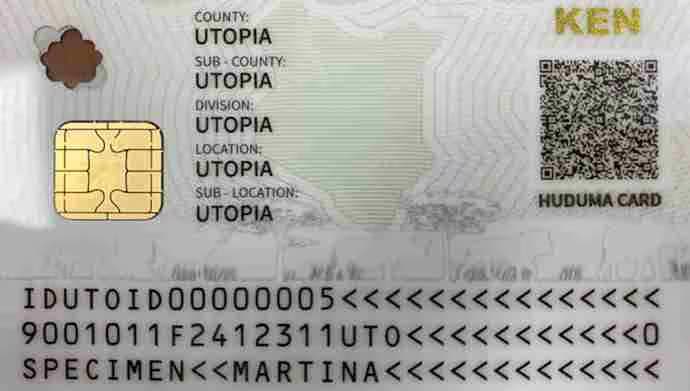We're loading the full news article for you. This includes the article content, images, author information, and related articles.
Kenya is rapidly advancing its digital identity system, Maisha Namba, aiming to streamline government services and boost the digital economy. However, the initiative faces public apprehension regarding data privacy and potential exclusion.

Kenya is at the forefront of a significant digital transformation with the ongoing rollout of its Maisha Namba digital identity system. This initiative, which includes a unique personal identifier (UPI) assigned at birth, aims to integrate civil and national identity databases, offering a streamlined approach to accessing government services and fostering a robust digital economy. The government's ambitious target is to issue 32 million Maisha Namba digital IDs within the next two years, with approximately 13 million Kenyans already having obtained the new generation ID.
The Maisha Namba system, introduced in 2023, assigns a 14-digit Unique Personal Identifier (UPI) at birth, intended to be a lifelong identity reference. This UPI will serve as the national ID number upon an individual reaching 18 years of age and will be used for various services, including school registration, social services, tax collection, and national health insurance. The electronic Maisha Card, launched on Thursday, November 1, 2023, replaces the previous generation of ID cards and features enhanced security details, including a microprocessor chip with encrypted data.
The Principal Secretary for Immigration and Citizen Services, Julius Bitok, stated in May 2024 that between 20,000 and 30,000 Maisha Namba digital IDs are issued daily. The government emphasizes that the digital ID will eliminate the need for duplicative data submission for citizens seeking authentication for various services. The eCitizen platform, a flagship digital portal for government services, currently has over 13 million registered users who are already utilizing a form of digital ID to access services.
Kenya's journey towards a comprehensive digital identity system dates back to 2019 with the amendment of the Registration of Persons Act, which established the National Integrated Identity Management System (NIIMS), also known as Huduma Namba. The Maisha Namba system builds upon lessons learned from previous attempts, addressing concerns such as data protection and public engagement. The government's broader digital transformation agenda is outlined in the Kenya National Digital Master Plan 2022-2032, which aims to position Kenya as a regional digital leader by leveraging technology for economic growth and improved service delivery.
The implementation of Maisha Namba is guided by Kenya's Data Protection Act, 2019, which regulates how organizations collect, process, store, and share personal data. The Act, closely aligned with the EU's General Data Protection Regulation (GDPR), established the Office of the Data Protection Commissioner (ODPC) to oversee compliance and enforcement. The government assures Kenyans that data safety is a priority, with mechanisms in place to ensure a smooth transition to the third-generation digital ID.
A draft policy is also under consideration by the Ministry of Investments, Trade and Industry (MITI) to introduce a compulsory digital ID for online commercial transactions. This aims to strengthen the digital commerce sector and combat fraud.
While the government highlights the benefits of enhanced service delivery and reduced bureaucracy, public concerns persist. Some citizens express apprehension about privacy and security, fearing potential misuse of personal information. The government, however, maintains that digital IDs will not be used for tracking citizens and that there will be no pooling of private information into a single, central dataset. Consultative meetings with various stakeholders, including development partners, media, civil society, and religious leaders, have been conducted to address these concerns.
The rapid digitalization, while offering numerous advantages, also presents risks. Concerns around data privacy and security remain paramount, necessitating robust safeguards and transparent data governance. The potential for exclusion of historically marginalized groups who may lack access to digital infrastructure or literacy is another critical consideration. The government has affirmed its commitment to ensuring no Kenyan is discriminated against in the acquisition of the digital ID.
Despite government assurances, some uncertainties persist regarding the long-term implications of a fully integrated digital identity system. The exact mechanisms for safeguarding against potential data breaches and the comprehensive framework for addressing citizen grievances related to data privacy are areas of ongoing public interest. The initial launch of the Maisha Namba faced court orders halting its issuance, highlighting the legal and public scrutiny surrounding such large-scale digital initiatives.
The government continues to accelerate its digital transformation agenda, with the goal of digitizing 80% of government services. The Maisha Namba system is a cornerstone of this plan, with ongoing efforts to onboard more services onto the eCitizen platform and enhance its security.
Key areas to monitor include the ongoing implementation of the Maisha Namba, particularly its reach to rural and underserved populations. The effectiveness of the Data Protection Act and the Office of the Data Protection Commissioner in addressing privacy concerns will be crucial. Furthermore, the development and public feedback on the proposed digital ID for online commercial transactions will shape the future of Kenya's digital economy.
Keep the conversation in one place—threads here stay linked to the story and in the forums.
Sign in to start a discussion
Start a conversation about this story and keep it linked here.
Other hot threads
E-sports and Gaming Community in Kenya
Active 9 months ago
The Role of Technology in Modern Agriculture (AgriTech)
Active 9 months ago
Popular Recreational Activities Across Counties
Active 9 months ago
Investing in Youth Sports Development Programs
Active 9 months ago